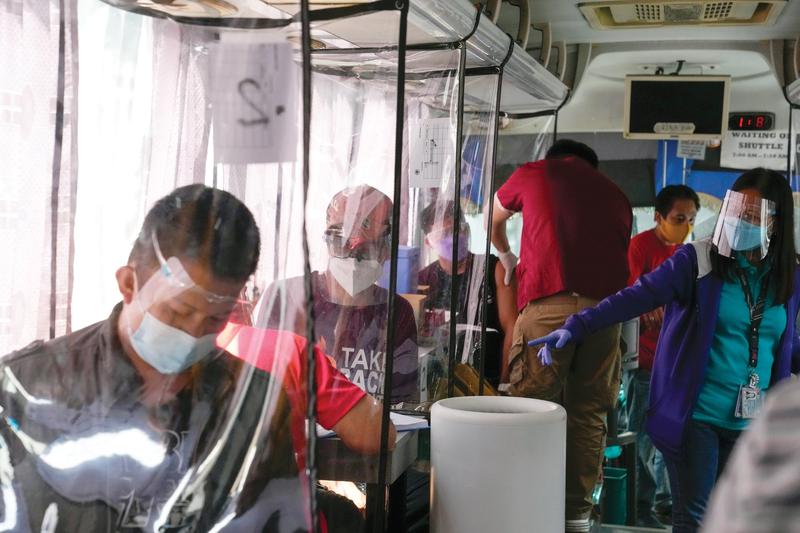 Filipinos wait their turn to be vaccinated in a bus that has been modified for the purpose in the city of Taguig on June 18. (AARON FAVILA / AP)
Filipinos wait their turn to be vaccinated in a bus that has been modified for the purpose in the city of Taguig on June 18. (AARON FAVILA / AP)
Aresurgence in COVID-19 infections and prolonged curbs to control the spread have made the task of shoring up the employment markets of Southeast Asia more challenging, experts said, calling on governments in the region to step up their policy responses.
Reviving the jobs market, especially in hard-hit industries such as tourism, catering and retail, also requires a faster pace of vaccinations to rein in the coronavirus, they said.
“The COVID-19 pandemic has disrupted regional supply chains due to the travel bans and lockdowns. It has also had an impact on several sectors, such as the tourism-related industry,” said Arisman, executive director of the Center for Southeast Asian Studies in Indonesia.
In Southeast Asia, where many countries are struggling to contain a new wave of infections, especially after the detection of new COVID-19 variants including Delta, the unemployment rate has been increasing at the macro level, said Arisman, who goes by one name.
In Vietnam, the news website VnExpress reported in June that nearly 31,900 tourism workers in the popular destination Da Nang have been laid off during the country’s latest COVID-19 wave that has brought more than 8,000 domestically transmitted cases since late April.
More than 90 percent of the city’s tourism companies have closed.
The Philippines’ Department of Health on June 20 reported 5,803 new infections, bringing the total number of confirmed cases to
1.36 million.
In Thailand, where the number of recorded infections topped 200,000 on June 15, the unemployment rate climbed to 1.96 percent in the first quarter of 2021. It was the highest level since 2009, at the height of the global financial crisis.
The International Labour Organization projects that the ranks of the unemployed will swell to 205 million next year due to the lingering effects of the pandemic, compared with 187 million in 2019.
Ruttiya Bhula-or, associate professor and vice-dean of the College of Population Studies at Chulalongkorn University in Bangkok, said the rise in Thailand’s unemployment can be largely attributed to the pandemic.
“The longer the COVID-19 pandemic remains, the impact would be even worse,” she said, noting that industries such as tourism, retail and manufacturing are among those worst hit.
Ruttiya added the unemployment rate only provides a limited picture about the labor market, as many people, though retaining their jobs, have had pay cuts or are working less.
Noting that Thailand recently approved a $16 billion loan plan to support the government’s COVID-19 measures, Ruttiya said even though there is an immediate plan for economic recovery, a clearer long-term plan is needed for improving employment.
Delays in vaccinations may also pose another risk for the recovery of market confidence, she said.
Arisman of CSEAS said the slow pace of vaccination presents a serious hurdle in boosting the jobs market.
He added that across Southeast Asia, support programs for migrant workers are largely lacking. Countries must work together to provide enough support for the group that is among the most vulnerable during the pandemic.
As many as 180,000 Indonesian migrant workers returned home in 2020, with 75 percent facing unemployment and some households seeing a 60 percent drop in income.
As some regional economies have shown recovery signs, there are hopes the jobs market will improve.
Tulika Tripathi, founder and CEO of hiring platform Snaphunt, said the employment outlook is positive — at least on the digital front.
The number of job postings on Snaphunt has more than doubled weekly since March.
Xinhua and agencies contributed to this story.


